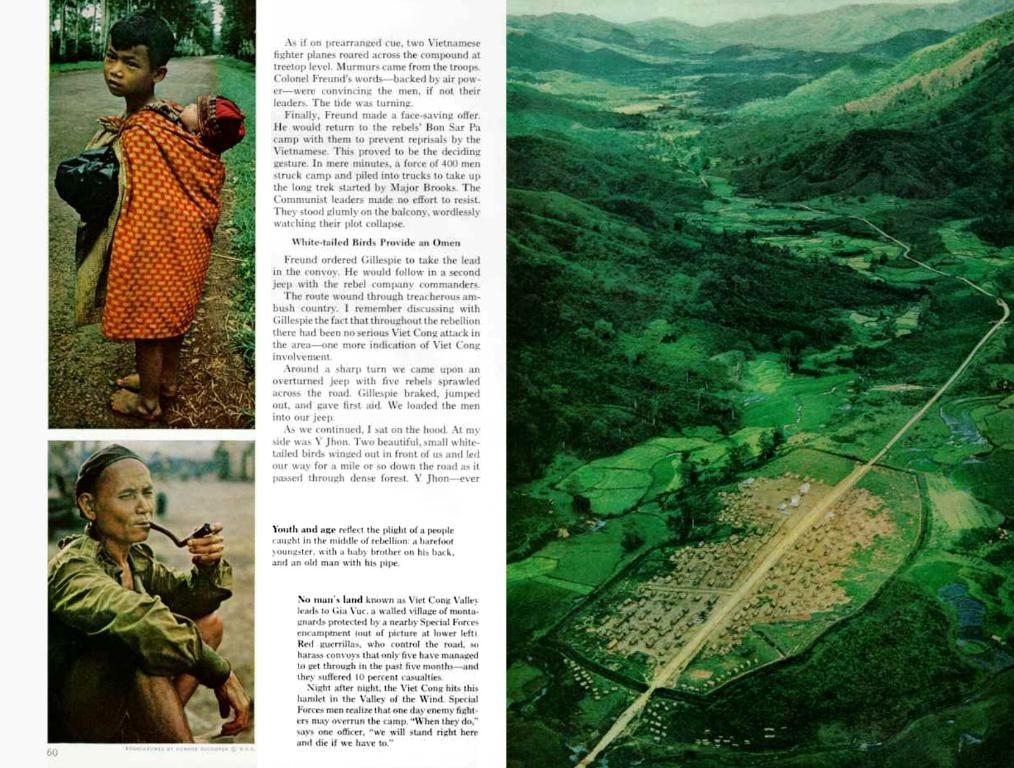Planting Seeds Abroad: Turkmenistan's Overseas Agricultural Expansion
Through the TAPI Pipeline Lens: A Groundhog Day Saga of Infrastructure
The trans-Afghan TAPI natural gas pipeline project seems more like a recurring dream than a tangible reality. This Groundhog Day-like spectacle features officials from various countries, chiefly Turkmenistan, Afghanistan, Pakistan, and India, regularly meeting and offering assurances that the project will shore up their fortunes. Yet, time and again, progress remains elusive.
But the clock is ticking. Recent developments have reignited hopes and cast fresh shadows, depending on the participant's vantage point.
In Kabul, officials met with their Ashgabat counterparts recently, discussing the urgency of kickstarting the long-stalled TAPI project. The Taliban-led Afghan government stated that they had provided adequate security guarantees, yet the project remains in limbo, with other involved countries yet to take decisive action.
Simultaneously, Pakistan is weighing the prospect of constructing an 80-kilometer pipeline stretch from the Gwadar port to the Iranian border, marking a new chapter in the long-delayed Iran-Pakistan gas pipeline. The move stems from concerns over potential financial penalties for inaction on a project that has spanned decades. An Iran-Pakistan pipeline could potentially compete with TAPI and create unease in Turkmenistan.
To complicate matters, Russia has thrown its hat in the ring as a potential supporter for both projects. In effect, Russia holds the key to shaping the economic fortunes of several regional countries, amplifying the geopolitical overtones. Moscow's efforts to strengthen its relationship with Turkmenistan add another layer of intrigue.
The diplomatic dance continued in Ashgabat as Russia's Ambassador lavished praise upon Turkmen diplomatic ingenuity and the nation's commitment to neutrality. Meanwhile, President Berdymukhamedov appointed a new prosecutor in Ashgabat, signaling some degree of political shuffling.
However, it's not all smiles and political maneuvers. Reports of corruption, embezzlement, and inefficiency in the regime have surfaced, raising questions about the government's priorities. With the cost of domestically produced flour soaring and subsidized state stores facing chronic shortages, the signs of a shifting economic strategy are clear.
The agricultural sector is feeling the brunt of these changes, as increased government payments for crops collide with escalating costs for fertilizers, irrigation, and renting government-owned equipment. This dynamic plays out against a volatile weather backdrop, with erratic temperature swings wreaking havoc on farmers and the agricultural sector.
As the pieces move, so does President Berdymukhamedov, meeting with the head of Italian aerospace and defense equipment manufacturer Leonardo to discuss a potential satellite purchase. This move might seem unrelated to the current discussions on infrastructure, but the satellite could provide a much-coveted exclusive digital data channel to bolster the regime's dream of a sovereign internet independent from external influences.
Amid the shifting landscape, the TAPI pipeline project continues to chase the elusive promise of regional cooperation and economic prosperity. Will it finally make it to the finish line this time around, or will it continue to remain stuck in the Groundhog Day rut? Time will tell, but for now, the TAPI project remains a tale of unfulfilled ambitions, political intrigue, corruption, and geopolitical tensions.
- The TAPI pipeline project, currently in a state of limbo, has historic implications, as it intertwines politics, geopolitics, and general news by involving nations like Turkmenistan, Afghanistan, Pakistan, and India.
- In the broader business sphere, Pakistan's consideration of an 80-kilometer pipeline stretch and Russia's interest in supporting both TAPI and the Iran-Pakistan pipeline are significant, as they could potentially shape the economic fortunes of regional countries and create competition.
- Meanwhile, the internal news within Turkmenistan reveals a complex situation, as the regime grapples with reports of corruption, embezzlement, and inefficiency while navigating shifting political priorities, economic instability, and volatile weather conditions, all of which affect the agricultural sector and domestic economy.








